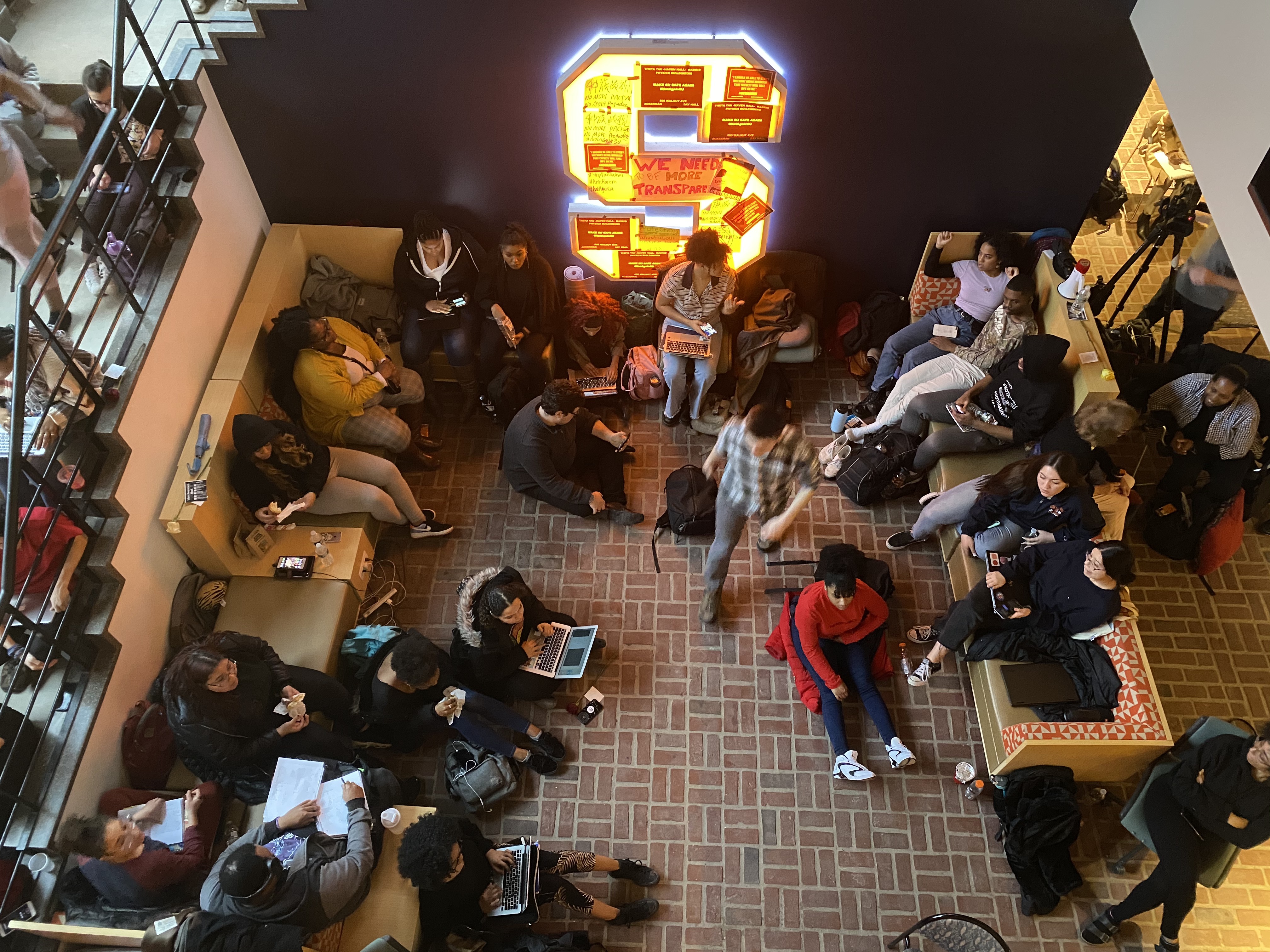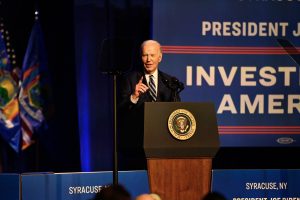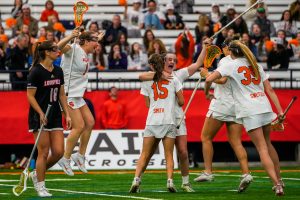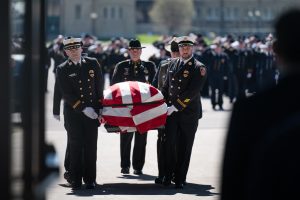#NotAgainSU, administrators meet for third day of negotiations
#NotAgainSU, officials discuss protestors demands
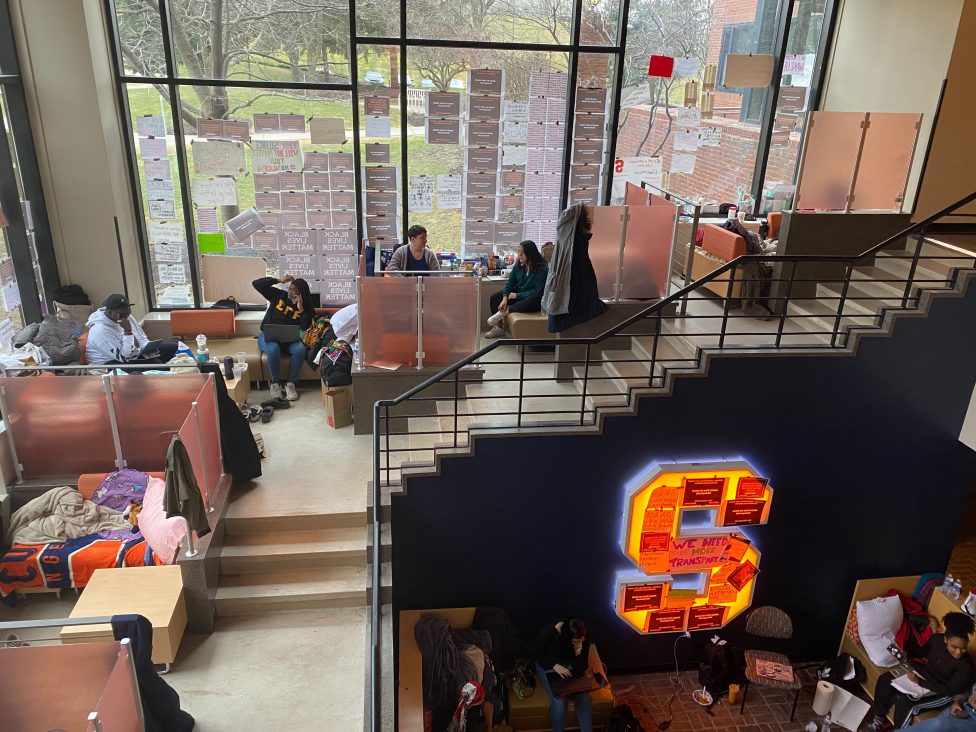
Student protestors gathered Wednesday afternoon in Crouse-Hinds with administrators for the third day in a row of their ongoing negotiation efforts.
The administrative officials present at the meeting received a series of questions and requests from students and faculty who were participating in the negotiations.
To begin, a student organizer, named Tayla, asked for no penalties against students who missed various classes or coursework because of the protest both inside and outside of Crouse-Hinds.
The Dean of Engineering and Computer Science Cole Smith told the organizers that faculty would be asked to forgive the missed time and offer space to students when they return to classes after the sit-in ends. He also said faculty wages would not be lost and there would not be negative performance evaluations due to their absence from classrooms.
When Interim Provost John Liu told students to “not underestimate our faculty’s compassion,” he was met with laughter and disbelief.
Aisha, a student organizer, spoke in frustration to administrators, saying, “What’s your position here if you can’t answer our questions? It’s a waste of time.”
Students clapped in agreement as more questions were fired at Smith, specifically ones relating to DPS conduct and practice. When asked about when and why DPS officers are required to have firearms, Smith declined to comment. But student organizers and parents of students present at Crouse-Hinds pressed further, questioning why there were no DPS representatives at the negotiations.
After a brief intermission, the negotiations started up again, with the discussion of the renewal of graduate student and faculty contracts for the upcoming semester. There were concerns amongst #NotAgainSU organizers that those people could be targeted regarding their affiliation with the movement.
When asked about the 18-day training DPS officers undergo to carry firearms, administrators declined to expand on the specific details of the training and the protocol of DPS. Administrators said those questions were “outside their jurisdiction,” to which student organizers responded by pushing back and asking why their questions were not being answered.
“It’s clear that you can’t answer any, not one, question that we pose,” said student organizer Aisha. “I already knew the answers to those questions. You are not in the position to speak about these.”
Administrative officials declined to disclose policies and procedures relating to DPS. Students then asked the administration to hold an open forum with the student body to discuss those DPS procedures as a request of transparency, but it was declined.
Student organizers asked how they could know if DPS protocol ensures their safety when they don’t even know the protocol, but administrative officials continued to deny to disclose that information.
Students expressed frustration with the lack of information provided from Gabriel Nugent, the deputy general counsel, who spoke mostly for the administration in regards to DPS.
Chief diversity and inclusion officer Keith Alford spoke in reference to the students’ frustration about the lack of transparency. He acknowledged that while it is important to keep detail-specific DPS tactics a secret, he said he knows the students are asking for a more general idea of policies.
“I hear that loud and clear,” he said. “It is not in my power to try, or should I say, to produce that because I don’t have those protocols in my purview.”
He said, moving forward, he would like to have a conversation with Bobby Maldonado, the chief of DPS, in order to gain a better understanding of how to better inform students.
Additionally, #NotAgainSU student organizer Yadi addressed the lack of safe spaces for students of color on campus, to which Rob Hradsky, the vice president of the student experience, responded by discussing the renovations of the Schine Student Center. He said there will be new spaces for students of color, LGBT resources, as well as a disability cultural center.
Students expressed frustrations with the combination of these three groups sharing a singular space, citing that students don’t always feel comfortable going to some of those offices.
When asked about the SEM 100 class, administrators identified particular curriculum within the syllabus when students will be taught about diversity issues like the protestors requested. There were weeks designated to talk about the various issues raised by the student organizers, but the students pushed back, saying that was not nearly enough time to educate people.
“Black students and students represented by NotAgainSU need to have a channel and a voice to the SEM 100 curriculum” said Smith.
Smith acknowledged those concerns and agreed that a one credit class, a three credit class or even a whole major could not solve the problems the campus currently faces.
The conversation then moved to the issues beyond campus. The original demands signed by the chancellor included a call for investment into student volunteer opportunities that would serve the low-income communities in the city of Syracuse.
The administration agreed to allocate 600,000 dollars to such volunteer initiatives, as well as to foster stronger relationships with the Syracuse community.
After this was agreed upon, students once again brought up their concerns with the handling of the Crouse-Hinds sit-in as well as the potential repercussions they will face. A student organizer, Victoria, expressed her concerns that the University’s lack of transparency regarding the protest will negatively impact their connections with the campus community.
“Relationships are going to be exceedingly more difficult if the administration does not name exactly what happened,” said student organizer Victoria.
Another student organizer claimed the administration was “gas-lighting” and went on to say that the conduct of the SU administration in the days after the sit-in began were “the definition of upholding white supremacy.”
Amanda Nicholson, assistant provost, said she delivered an apology on behalf of the administrator on Monday night and that she stands by her words. She continued by saying the Chancellor sent out an email apologizing to the entire campus community. However organizers felt they failed to take responsibility for specific acts that were concealed from the student body.
Administrators and organizers agreed to launch an investigation into how the university handled the protests. However, after this discussion was agreed upon, the administrators said they had already selected an investigator without input from the protestors.
-By AJ Carrion, Brooke Kato and Anne Hayes
The second day of formal talks between #NotAgainSU protesters and Syracuse University administrators continued Tuesday afternoon with an emphasis on the Department of Public Safety.
While expressing frustration that neither DPS Chief Bobby Maldonado nor associate chief John Sardino was present at Tuesday’s meeting, protesters pressed administrators on several campus safety issues during the four-hour session.
When the topic of disarming DPS officers came up, protesters argued that officers do not have enough weapons training and challenged the need to arm officers in case of an active shooter or some other dangerous threat. That justification does not outweigh the fact that people of color constantly feel threatened by armed officers, student protestors said.
Also, protesters requested DPS to disclose its firearms procedures and suggested it’s unsafe for officers to respond to a student house party noise complaint armed.
SU deputy general counsel Gabriel Nugent, who responded to many of the campus safety concerns during Tuesday’s talks, said the administration was not authorized to disarm DPS officers or disclose active shooter protocols, as well as could not speak to the department’s weapons procedures.
Dean of Students Marianne Thomson then suggested the demands may not be able to met with these negotiations.
“That is not something that I think is appropriate for any of us to say we can figure it out over a couple hours right now or even if we go into tomorrow on the same question,” Thomson said. “It’s just not the right way to make a decision this big.”
Thomson’s response triggered protesters to claim that the administrators were ill-prepared for the negotiating and end to a protest that started more than two weeks ago with dozens of students occupying the Crouse-Hinds lobby.
“I have missed two-and-a-half weeks of class and most likely miss another half week or maybe four weeks of class,” student protestor Jonathan Chau said. “That’s disrespectful to me as someone who has to apply to fricking graduate school in a year.”
Negotiations are slated to continue Wednesday afternoon.
Negotiations began between #NotAgainSU organizers and SU administrators at Crouse-Hinds Hall on Monday evening. The structure of negotiations was outlined in a meeting on Feb. 26.
Moderator Jeffery Mangram, an associate professor in the School of Education, began the conversation with introductions and then invited #NotAgainSU to present their opening statement.
“Syracuse University’s repugnant and violent response to NotAgainSU’s peaceful protest undeniably illustrated the University’s allegiance to white supremacists and institutional violence,” said one student organizer in the opening statement.
The administration responded by formally apologizing to the #NotAgainSU protestors for how the University responded to their occupation of Crouse-Hinds Hall. They specifically apologized for the interim suspensions, as well as the suspension of students who were not involved with the sit-in protest.
After opening statements, the conversation began with the updated version of the original demands. This included the expansion of Multicultural Living Learning Communities, the resignations of several administrators including the Chancellor, a freeze on tuition, expanding counseling resources and the conduct of the Department of Public Safety.
Much of the dialogue was dominated by the semantics of the demands and discrepancies between the list signed by Syverud and the original demands presented by #NotAgainSU. There was a great deal of confusion as to which version of the demands the Chancellor signed in the fall semester.
#NotAgainSU organizers claim that the demands signed by Syverud were edited and not true to the original demands. In addition, the administrators clarified that they are not considering the addendums to the demands, they are reviewing the demands signed by Syverud.
Organizers demanded Chancellor Syverud be present for the negotiations. However, he was called away from campus for meetings regarding the outbreak of coronavirus, which caused SU to suspend study abroad programs and international travel. As a compromise, Syverud agreed to make himself available via phone from 5p.m. to 6p.m. However, the Chancellor cut the call short at 5:41 in order to return to a meeting.
When Syverud joined the conversation administrators and organizers were discussing their confusion over the demand for Multicultural Living Learning Communities (MLLC) to be featured in every residence hall on campus.
Organizers claimed that in the original demand expansions they specified that MLLCs must be included in every residence hall. However, the demands signed by Syverud requires “more” MLLCs and does not specify the need for one in every residence hall.
Dean of Students Marianne Thomson told organizers that she is hesitant to commit to expending MLLCs to every dorm as a result of low interest in these communities. However, she suggested that the lack of interest may be a result of the academic requirements that these communities demand. Thomson suggested these learning communities be replaced by “themed” floors that would replicate MLLCs without the course requirements.
“We absolutely support this,” said Thomson.
#NotAgainSU organizers pushed back against this, asking if a third category of housing could be created. They believe designating these new living communities as “themed” equates LGBTQ+ and multicultural living communities with certain designed outdoor and adventure “themed” floors seen in different residence halls on campus.
Organizers wanted to continue the conversation about MLLC expansion. However, administrators urged them to address the chancellor with demands directly concerning him while he was available over phone.
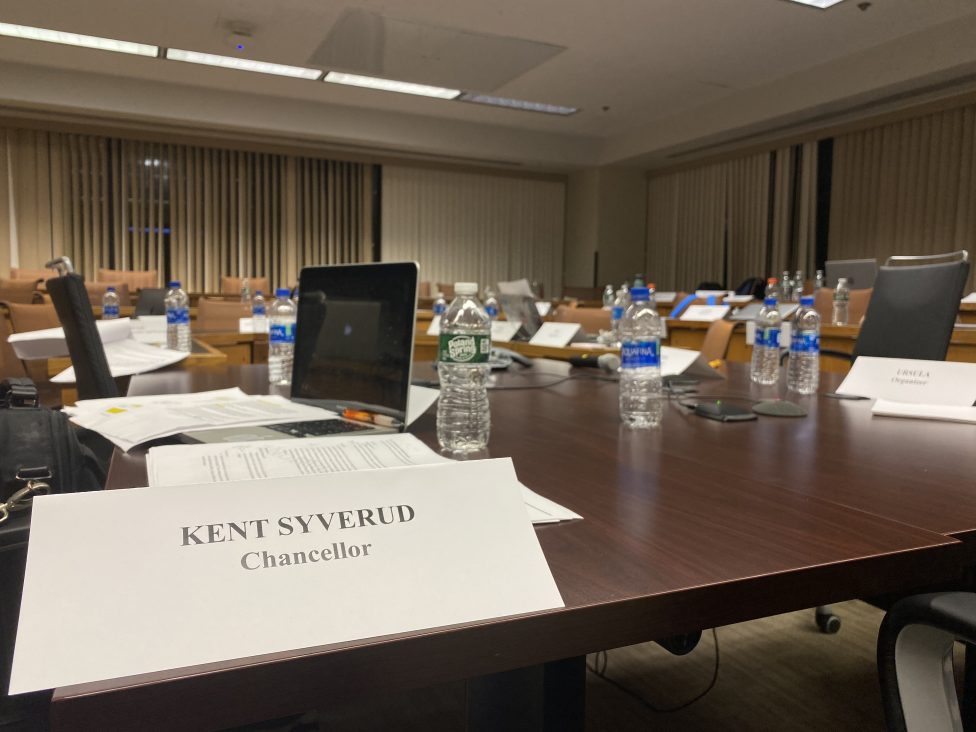
The next topic of conversation was to address the resignations demanded by #NotAgainSU. Organizers asked Syverud directly for his response to their demand calling for the resignation of VP for Enrollment and Student Experience Dolan Evanovich, Chief of DPS Bobby Maldonado, Deputy Chief John Sardino, and Syverud himself.
“I do not intend to walk away from my responsibilities as Chancellor,” responded Syverud.
He said he did not believe that the resignation of senior officials is in the “best interest” of the University. He accepted responsibility for how the administration handled the onset of the Crouse-Hinds Hall protest but expressed he had no intention of resigning.
The conversation moved on as administrators and organizers accepted a temporary stalemate on the issue. The final question directed toward Syverud regarded installing a freeze on tuition. This would require the University to stop raising tuition apart from adjustment to match inflation rates.
“I do not set tuition. The board sets tuition,” said Syverud.
This incited complaints from organizers who had stressed at their previous meeting Thursday that the attendance of the Board of Trustees was paramount to these negotiations, regardless of their ability to physically attend.
Organizers requested that Syverud relay to the board that their presence has been demanded for the negotiations that will resume Tuesday at 4p.m. in Crouse-Hinds. They stressed that they are willing to have board member Skype or Zoom in rather than requiring them to physically attend the meeting.
Syverud agreed to pass on their message and then expressed he had to return to his meeting and ended the call 41 minutes into the negotiations, despite his promise to allocate one hour for them.
Negotiations continued despite Syverud’s abrupt exit. The conversation moved on to the demands regarding the access to counseling on campus. #NotAgainSU specified in their demands that the ratio of counselors to students should be not more than one councilor to every 500 students.
Rob Hradsky, VP for the Student Experience, and Thompson attempted to align their projections with this figure by only considering the 15% of students they stated are seeking help. #NotAgainSU organizers countered this, stating that more students would seek help if there were adequate services and rejected their figure. They simplified the demand by asking Hradsky to commit to hiring nine new therapists by the Fall 2020 semester. Hradsky said he would be unable to promise this by ensured there would be four new therapists. Organizers were still unsatisfied with this result but moved on to another topic in the interest of time.
The protesters expressed their displeasure in DPS’s responses to bias-related incidents. They brought up a few cases in which DPS took longer than the 48-hour window outlined in the protesters’ November demands to alert students of the incident and announce an investigation. A representative from DPS said that sometimes DPS fears “tipping off” perpetrators so they do not disclose their investigation.
Faculty ally and associate professor Jenn Jackson spoke of her experience of the conflict between John Sardino and protesters, where Sardino was saw reaching for his holster while trying to close the door to Crouse-Hinds Hall as protesters stood in the way.
“My children were terrified,” Jackson said.
#NotAgainSU expressed their frustration with how the administration has dealt with the bias-related incidents as well as systemic and institutional racism.
“We can’t move forward until we name those things… This should be the easiest thing,” one of the protesters said.
Keith Alford, Chief Diversity & Inclusion Officer at SU said that African Americans have had to deal with “institutional and systemic racism” at all institutions and universities, “including this one” and that there should be a formal acknowledgement of this followed up by action.
“We have to acknowledge, we have to atone,” he said.
The protesters would also like the administration to disclose the names of perpetrators of the bias-related incidents and how they were punished. The administration claims that disclosing the identities of the perpetrators would be a violation of the Family Educational Rights and Privacy Act.
The meeting concluded promptly at 8:00 p.m. and the negotiations are set to resume at 4:00 p.m. Tuesday in Crouse-Hinds Hall.
